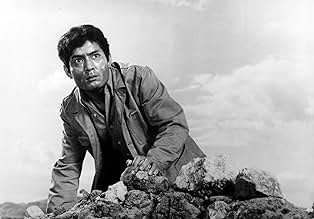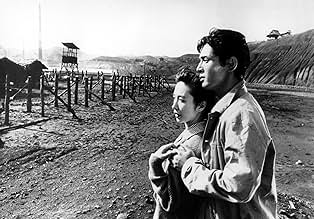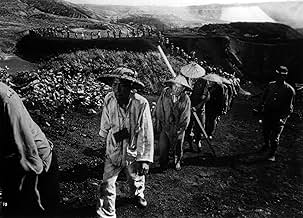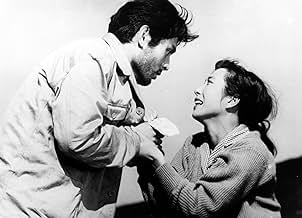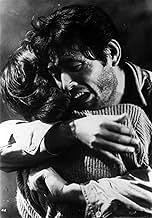La condizione umana: Parte I - Nessun amore è più grande
Un pacifista giapponese, incapace di affrontare le terribili conseguenze dell'obiezione di coscienza, viene trasformato nel suo tentativo di soddisfare le richieste del Giappone in tempo di ... Leggi tuttoUn pacifista giapponese, incapace di affrontare le terribili conseguenze dell'obiezione di coscienza, viene trasformato nel suo tentativo di soddisfare le richieste del Giappone in tempo di guerra.Un pacifista giapponese, incapace di affrontare le terribili conseguenze dell'obiezione di coscienza, viene trasformato nel suo tentativo di soddisfare le richieste del Giappone in tempo di guerra.
- Regia
- Sceneggiatura
- Star
- Premi
- 5 vittorie e 1 candidatura in totale
- Kô
- (as Shinji Nanbara)
Recensioni in evidenza
While it is a powerful film which portrays much of the suffering and brutality visited on the Chinese in Manchuria by the Japanese war machine, it is not without some rather unlikely plot twists. In particular, Kaji seems somewhat too saint-like to be believable.
It is worth mentioning that the title "The Human Condition" is perhaps misleading. The Japanese word "jouken" corresponding to "condition" is not normally used in a descriptive sense, but rather, as a condition to be fulfilled or satisfied. Thus the title might be better rendered "The Conditions for Being Human"--the implication being that in wartime, the conditions for remaining fully human are elusive at best.
While the story has an immediate appeal (or rather connection-to) the Japanese public as a piece of modern history- the occupation/decimation of Manchuria and its people- none of its dramatic or emotional power is lost on me. Kobayashi is personally tied to the material very much (he himself fought in the war and immediately bought the rights to the 6-volume series when first released), but he doesn't ever get in the way of the story. Matter of fact, he's a truly amazing storyteller first and foremost; dazzlingly he interweaves the conflicts of the prisoners (i.e. Chen, the prostitutes, Kao) with Kaji's first big hurdle of conscience at the labor camp as he sees prisoners treated in horrible conditions, beaten, abused, and eventually brought to senseless deaths thanks to Furyua and his ilk, and finds himself brought to an ultimate question: can he be a human being, as opposed to another mindless monster?
Kobayashi creates scenes and moments that are in the grand and epic tradition of movies, sometimes in beautiful effect and other times showing for the sake of the horrors of wartime (for example, there will never be as harrowing an exodus from a half-dozen cattle cars as seen when the Chinese POW's exit from there to the food sacks), and is able with his wonderful DP to make intimately acted scenes in the midst of wide scapes like the outside ore mines and the cramped living quarters or caves. And damn it all if we don't get one of the great scenes in the history of movies, which is when the six "escapees" are put to execution with the prisoners, and horrified Kaji, watching in stark, gruesome detail. Everything about that one scene is just about perfect.
But as the anchor of the piece (and unlike the other two films, he's not even in every scene of this part), Tatsuya Nakadai delivers on his breakthrough performance. Kobayashi needed a bridge between pre and post-war Japan, and Nakadai is that kind of presence. But aside from being an appealing star- the kind you don't want to avert your eyes from- he's mind-blowingly talented be it in subtle bits of business or when he has to go to town in explosive emotional scenes (or, also, just a twitch under his eye in a super-tense exchange). This goes without saying other actors right alongside him- Aratama, Yamamura, Manbara- are perfectly cast as supervisor, prisoner, prostitute, wife alike to Kaji. And yet, for all the praise worth giving to the film, one that gets even better in its second half than its first, this is only the first part!
The first part sees Kaji, a young, well-to-do Japanese, begin work as labor supervisor in a POW camp in occupied Manchuria. What could have been an interesting honeymoon with new loving wife Michiko and the start to a promising career slowly devolves into a nightmare: Kaji tries to stay true to his human principles while getting increasingly tangled in a complex web that involves escaping prisoners, abusive guards, and a tyrannical, bullish army that is above the law.
As an indictment of the Japanese Imperial Army, it is all the more haunting for coming from one who served under it. And to Kobayashi's credit, never does this come across as a crass moral lecture. It is a stunning, gripping study in mounting desperation, anchored by a powerful turn from the ever-dependable Nakadai.
Japanese cinema of this period has its quirks, stylish acting and a tendency to melodrama that can bemuse Western viewers. While I find Kobayashi less impaired by these traits than many of his contemporaries – especially in the cold, restrained anger and sorrow of Harakiri, his masterpiece – he gets heroic support from his star of choice. Far from the histrionics and bravado of a Toshiro Mifune, Japan's other megastar of the 50s and early 60s, Tatsuya Nakadai's magnetic charisma is far more subdued and heartfelt. Though our hero is at times unbelievably decent, perhaps buoyed by his youthful optimism and love for his wife, Nakadai makes every situation and painful decision resonate.
The technical credits are the usual for this under-appreciated director's work: arresting visuals, sweeping movement, carefully crafted sets. And the supporting players leave their mark, with a stand-out in each episode. In this instance, particularly Kaji's conflicted assistant, originally mistakable for a simple brute, finds very different ways of dealing with his own crisis of conscience.
This is definitely a film you have to see. Just make sure you clear your schedule, as you don't want to spread the viewing chunks too thin if watching in fragments
Lo sapevi?
- QuizAccording to Tatsuya Nakadai, a marathon screening of the entire nine-and-a-half-hour "Human Condition" trilogy is held once a year in Japan, and he has once or twice attended these screenings, which are always sold out.
- BlooperAt one point a Japanese guard begins to whip Kao, yet the motions he makes are just a flailing of his arms, visibly missing the actor. Kao retaliates by throwing a rock at the guard, but the rock never strikes the guard. However, the actor playing the guard overreacts as if he has been struck.
- Citazioni
Kuroki Shochô: You know, Kaji, theory may be correct and yet not always apply to reality.
Kaji: Then either the theory is wrong or it was incorrectly applied.
- ConnessioniFollowed by La condizione umana: Parte II - Cammino verso l'eternità (1959)
I più visti
- How long is The Human Condition I: No Greater Love?Powered by Alexa
Dettagli
- Data di uscita
- Paese di origine
- Lingue
- Celebre anche come
- The Human Condition I: No Greater Love
- Luoghi delle riprese
- Hokkaido, Giappone(Exterior scenes of the Manchurian mine)
- Aziende produttrici
- Vedi altri crediti dell’azienda su IMDbPro
- Tempo di esecuzione3 ore 28 minuti
- Colore
- Mix di suoni
- Proporzioni
- 2.35 : 1
Contribuisci a questa pagina



